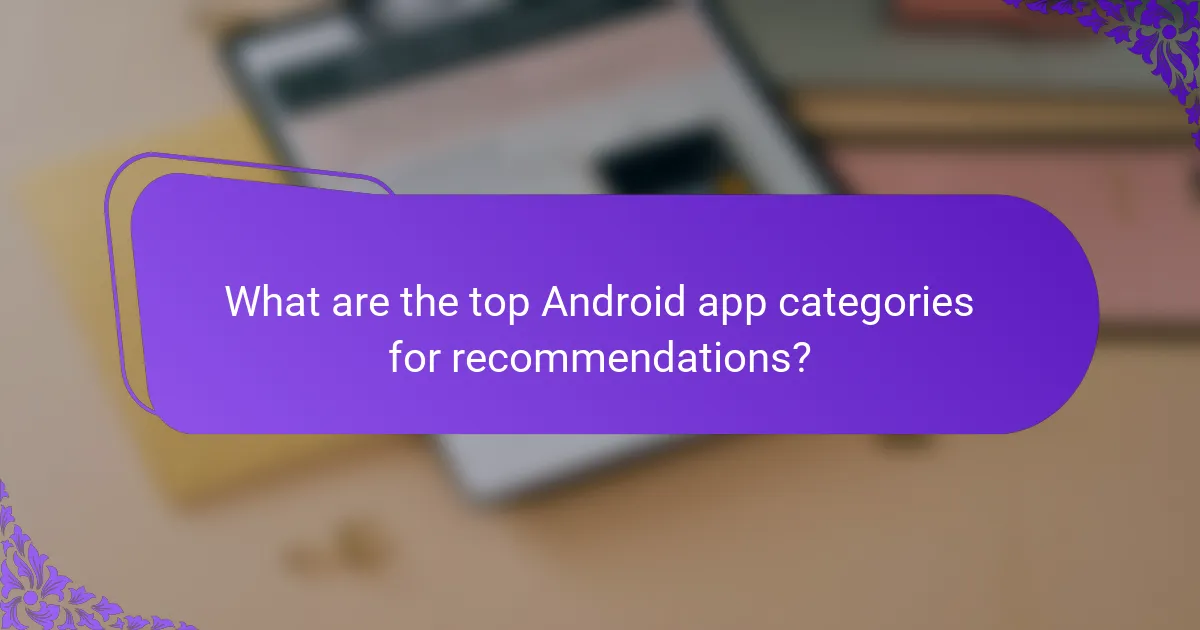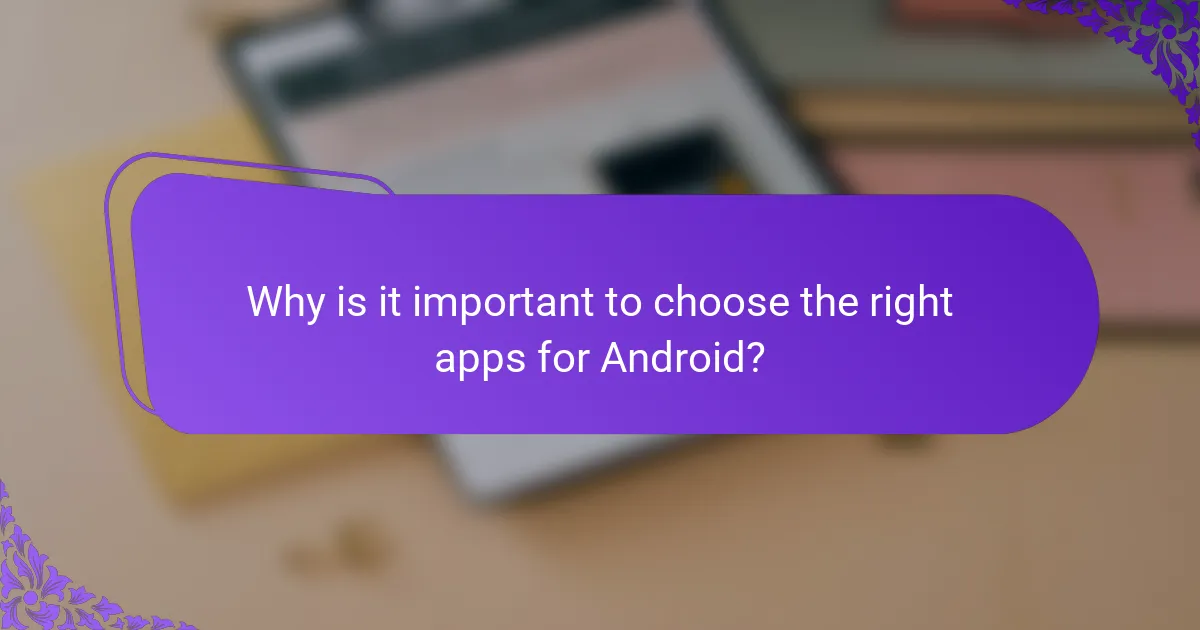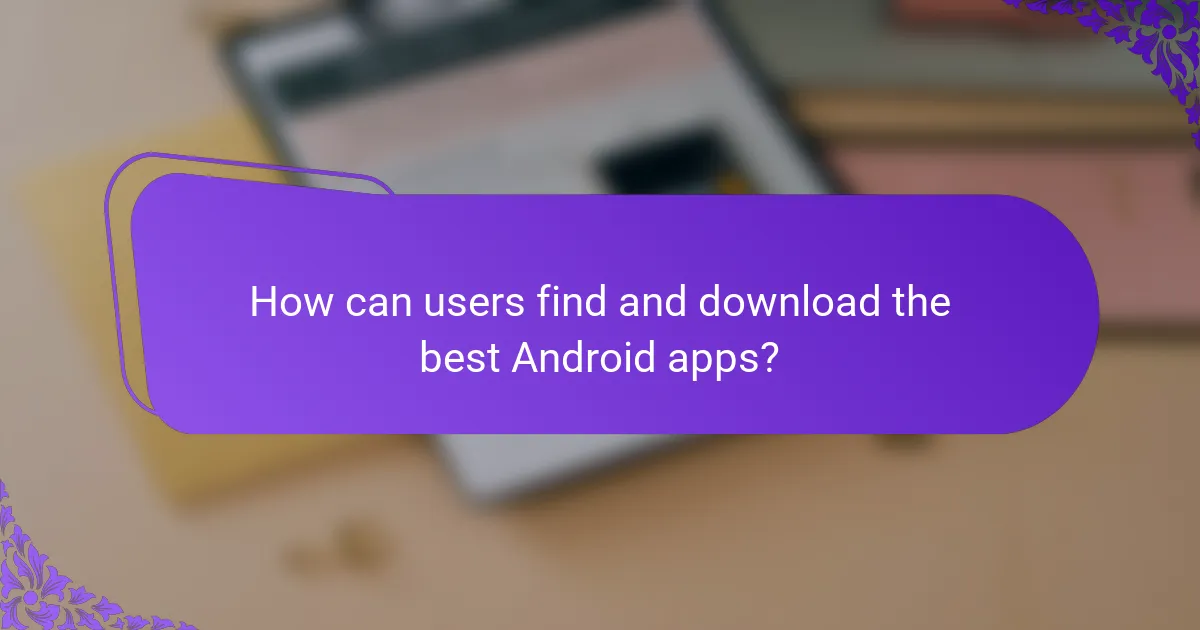The article focuses on Android app recommendations, specifically in the categories of productivity, entertainment, and utility. It highlights the importance of selecting high-quality apps to enhance device performance and user experience. Productivity apps, such as task managers and note-taking tools, help users manage their tasks efficiently, while entertainment apps include streaming services and games for leisure. Utility apps provide essential functions like file management and system optimization. The article also discusses how to navigate the Google Play Store to find top-rated apps based on user reviews and curated lists, emphasizing the need for careful selection to avoid app fatigue and performance issues.

What are the top Android app categories for recommendations?
The top Android app categories for recommendations include productivity, entertainment, and utility. Productivity apps help users manage tasks and enhance efficiency. Popular examples are task managers and note-taking applications. Entertainment apps provide leisure activities, such as streaming services and games. Utility apps offer essential functions like file management and system optimization. According to Statista, productivity and entertainment apps consistently rank among the most downloaded categories on the Google Play Store.
How do productivity apps improve efficiency on Android devices?
Productivity apps enhance efficiency on Android devices by streamlining tasks and organizing workflows. These applications offer features such as task management, time tracking, and note-taking. They help users prioritize activities and set deadlines. For example, apps like Todoist enable users to create to-do lists and categorize tasks. Additionally, calendar apps allow for scheduling and reminders, reducing the likelihood of missed appointments. Research indicates that using productivity tools can increase individual efficiency by up to 25%. This is supported by a study from the University of California, which found that organized task management leads to improved focus and reduced stress.
What features should users look for in productivity apps?
Users should look for several key features in productivity apps. A user-friendly interface enhances usability. Cross-platform synchronization ensures access across multiple devices. Task management capabilities help users organize their workload. Collaboration tools facilitate teamwork and communication. Customization options allow users to tailor the app to their needs. Offline access provides functionality without an internet connection. Integration with other tools streamlines workflows. Security features protect user data from unauthorized access. These features collectively enhance productivity and efficiency in daily tasks.
Which productivity apps are considered the best on Android?
The best productivity apps on Android include Todoist, Trello, and Microsoft Office. Todoist is known for its task management features and user-friendly interface. Trello offers a visually appealing way to organize projects using boards and cards. Microsoft Office provides essential tools for document creation and collaboration. According to user reviews and ratings on the Google Play Store, these apps consistently rank high for functionality and ease of use.
What entertainment apps are popular among Android users?
Popular entertainment apps among Android users include Netflix, YouTube, Spotify, and TikTok. Netflix offers a wide range of movies and TV shows. YouTube provides user-generated content and music videos. Spotify is known for music streaming and curated playlists. TikTok features short-form videos and creative content. According to Statista, Netflix had over 230 million subscribers worldwide as of 2023. YouTube has more than 2 billion monthly users. Spotify has over 500 million active users. TikTok reached 1 billion monthly active users in 2023. These statistics highlight the popularity and user engagement of these entertainment apps.
How do entertainment apps enhance user experience?
Entertainment apps enhance user experience by providing personalized content and interactive features. They use algorithms to analyze user preferences and suggest relevant media. This personalization increases engagement and satisfaction. Features like social sharing enable users to connect with friends. Interactive elements such as quizzes and polls keep users actively involved. Additionally, entertainment apps often offer offline access to content. This flexibility allows users to enjoy media without internet connectivity. According to a study by Statista, 45% of users prefer apps that offer tailored recommendations. Overall, these attributes contribute to a more enjoyable and immersive experience.
What genres of entertainment apps are available on Android?
Entertainment apps available on Android include various genres. Popular genres are streaming services, gaming, music, and social media. Streaming services provide access to movies and TV shows. Gaming apps range from casual to competitive games. Music apps allow users to listen to and discover new songs. Social media apps enable users to connect and share content. Each genre offers unique features tailored to user preferences. The Google Play Store categorizes these genres for easy navigation.
What utility apps are essential for Android users?
Essential utility apps for Android users include file management, note-taking, and system optimization tools. File management apps like Google Files help users organize and manage storage efficiently. Note-taking apps such as Evernote allow users to capture ideas and information quickly. System optimization tools like CCleaner help improve device performance by clearing cache and junk files. Additionally, password managers like LastPass enhance security by managing user credentials. These apps collectively enhance productivity and usability on Android devices.
How do utility apps simplify daily tasks on Android devices?
Utility apps simplify daily tasks on Android devices by providing specialized tools that enhance efficiency. These apps streamline functions like note-taking, task management, and file organization. For example, a note-taking app allows users to capture ideas quickly and access them easily. Task management apps help prioritize and track daily responsibilities, reducing forgetfulness. File organization apps enable users to manage documents and media seamlessly, improving access and retrieval. Research shows that users experience increased productivity when utilizing these apps effectively. According to a study by Statista, 77% of smartphone users rely on utility apps to manage daily activities.
What are the top-rated utility apps for Android?
The top-rated utility apps for Android include Google Drive, Microsoft Office, and Evernote. Google Drive offers cloud storage and file sharing, essential for collaboration. Microsoft Office provides access to Word, Excel, and PowerPoint on mobile devices. Evernote is a versatile note-taking app that organizes information efficiently. Other notable mentions are Tasker, which automates tasks, and LastPass, a secure password manager. These apps enhance productivity and streamline daily tasks for Android users.

Why is it important to choose the right apps for Android?
Choosing the right apps for Android is crucial for optimal device performance and user experience. The right apps can enhance productivity, provide entertainment, and improve utility. Conversely, poorly chosen apps may lead to slow performance, excessive battery drain, and security vulnerabilities. According to a study by the University of California, Berkeley, 90% of mobile users experience app fatigue from poorly designed applications. This emphasizes the importance of selecting high-quality, efficient apps that meet user needs. Additionally, the Google Play Store features over 2.8 million apps, making it essential to discern which ones are truly beneficial.
How can the right apps impact productivity and entertainment?
The right apps can significantly enhance productivity and entertainment. Productivity apps streamline tasks, improve organization, and facilitate collaboration. For instance, tools like Trello and Asana help users manage projects effectively. They allow users to set deadlines and track progress, which boosts efficiency.
Entertainment apps provide access to a vast array of content. Streaming services like Netflix and Spotify offer diverse options for movies and music. These apps keep users engaged and entertained during leisure time.
Research shows that productivity apps can boost output by up to 25%. This statistic underscores their effectiveness in improving work efficiency. Similarly, entertainment apps increase user satisfaction by offering personalized experiences. This dual impact highlights the importance of selecting the right apps for both productivity and enjoyment.
What criteria should users consider when selecting Android apps?
Users should consider several criteria when selecting Android apps. First, they should evaluate the app’s user ratings and reviews. High ratings often indicate reliability and user satisfaction. Next, users should check the app’s permissions and privacy policies. Apps that require excessive permissions may compromise user data security. Additionally, the app’s update frequency is important. Regular updates suggest active development and improved functionality. Users should also look for compatibility with their device’s operating system version. Compatibility ensures optimal performance. Finally, they should consider the app’s functionality and features. Apps that meet specific user needs are more likely to be beneficial.

How can users find and download the best Android apps?
Users can find and download the best Android apps by exploring the Google Play Store. The Play Store features a dedicated section for top-rated apps based on user reviews and ratings. Users can also browse categories like productivity, entertainment, and utilities to discover popular options. Additionally, curated lists and editor’s picks highlight recommended apps. Searching for specific app features or functions can yield tailored results. Users should check app descriptions and screenshots for quality assessment. Regular updates and user feedback further ensure the app’s reliability and performance.
What are the best practices for discovering new apps on Android?
Utilize the Google Play Store for discovering new apps on Android. The Play Store features curated lists and categories. Check the “Top Charts” for trending applications. Explore the “New Releases” section for the latest offerings. Read user reviews for insights on app performance. Use app recommendation websites for expert suggestions. Follow tech blogs for updates on popular apps. Engage with online communities for personal recommendations.
How can app reviews and ratings guide app selection?
App reviews and ratings significantly influence app selection. Users often rely on these evaluations to gauge app quality and performance. High ratings typically indicate user satisfaction and functionality. Conversely, low ratings may signal issues such as bugs or poor user experience. According to a study by Apptentive, 77% of users read reviews before downloading an app. Reviews provide insights into specific features and usability, helping users make informed decisions. Additionally, recent data shows that apps with at least a 4-star rating are more likely to be downloaded. This reliance on reviews and ratings shapes user expectations and choices in app selection.
What are the risks of downloading apps from unofficial sources?
Downloading apps from unofficial sources poses significant risks. These apps often lack proper security measures. This increases the likelihood of malware infections. Malware can lead to data theft or device damage. Unofficial apps may also compromise user privacy. They can track personal information without consent. Additionally, these apps often do not receive regular updates. This leaves them vulnerable to known security flaws. According to a study by the University of California, 97% of malware is found in unofficial app stores. Thus, downloading from these sources is highly risky.
What tips can help users maximize their app experience on Android?
To maximize app experience on Android, users should regularly update their apps. Updates often include performance improvements and new features. Users should also manage app permissions for better privacy and security. This can enhance overall app functionality. Organizing apps into folders can streamline access and improve navigation. Utilizing widgets can provide quick information without opening apps. Users should clear app caches periodically to improve performance. Lastly, enabling battery optimization settings can extend device usage time while using apps.
The main entity of the article is Android app recommendations, focusing on top categories such as productivity, entertainment, and utility. The article provides insights into how productivity apps enhance efficiency, highlights popular entertainment options, and identifies essential utility tools for Android users. Key features to look for in productivity apps are discussed, along with the impact of the right apps on user experience. Additionally, the article covers criteria for selecting apps, best practices for discovering new options, and the risks associated with unofficial app downloads.